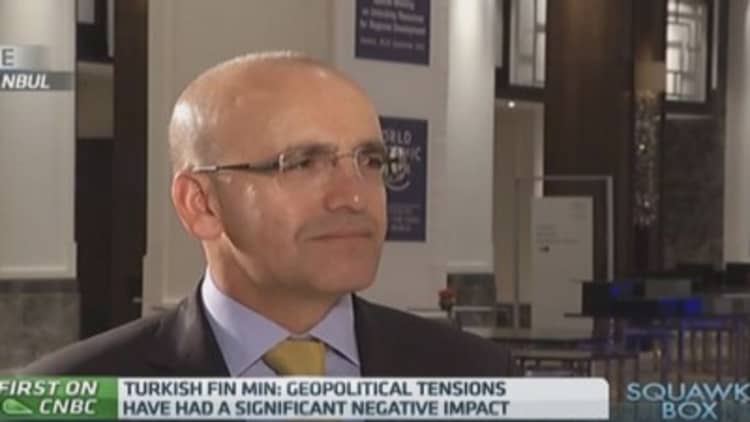
With market participants currently expecting a full-blown quantitative easing program (QE) from the European Central Bank (ECB), the finance minister of Turkey has told CNBC that it will have positive effects for emerging markets like his and will offset concerns over the normalization of Federal Reserve policy.
Read MoreTurkey unveils legislation to tighten control over internet
The Turkish lira is trading at near 8-month lows with several emerging markets showing weakness recently as investors anticipate higher rates in the U.S. However, Mehmet Simsek, said that stimulus from the ECB would be "relevant for Turkey" with its "strong linkages" to the euro zone.
"It's good news for us," he told CNBC Monday. He said that the positives for the Turkish economy are currently outweighing the negatives but added that a governmental target for 4 percent growth this year was perhaps unachievable due to a number of unforeseen events.
Read More
"Downside risks to our growth forecasts have risen, " he said, mentioning the conflicts in Iraq and Syria as well as a continued slump in the euro zone.
Simsek acknowledged that Turkey has an inflation problem with consumer price growth this summer edging closer to 10 percent. The country's central bank has previously been dovish to try to stimulate growth. It decided to leave interest rates untouched on Friday. However, Reuters reported that the bank decided to increase its daily foreign exchange auctions and tighten lira liquidity in an attempt to temper the fall for the country's currency.
Policymakers in Turkey have been openly critical of credit rating agencies in the past, with Standard & Poor's having a sub-investment grade outlook on the country's debt. There's been renewed talk in recent weeks that other agencies are looking to rate it similarly despite calls from the government that Turkey's current account deficit is narrowing.
Gross domestic product rose by an annualized 2.1 percent in the second quarter which was significantly lower than the 4.6 percent seen in the previous period. Tukey's BIST 100 index based in Istanbul is down 5.2 percent this quarter but has still managed to clock gains of 9.6 percent so far this year.
Speaking at a special event in Istanbul over the weekend, facilitated by the World Economic Forum, President Tayyip Erdogan told an audience that credit rating agencies had been making "nonsensical statements" about Turkey being stagnant.
"These are not really based on scientific data. We paid money to these ratings organizations, we decided not to because we did not think those ratings to be well founded," he said.
"We are working with two other (agencies) which we thought would work honestly but they too seem to be making political decisions when they decide Turkey's grade."
Read MoreDovish Draghi—crying wolf or QE next week?
Simsek seemed to back up the comments of his colleague, telling CNBC that these organizations have made wrong decisions on numerous occasions and remain overly cautious on Turkey's economy.
Timothy Ash, the head of emerging markets research at Standard Bank, is relatively sympathetic to the words of the two lawmakers, believing that data from the country do not suggest much in terms of an obvious rationale for a downgrade.
"There has been little real deterioration in public finances," he said in a recent research note on Friday. "Geopolitical risks in the region are perhaps rising, but Turkey lives in a difficult region, and this is part of the 'Turkey risk' and Turks and the Turkish economy have a knack of adjusting."
Follow us on Twitter: @CNBCWorld



